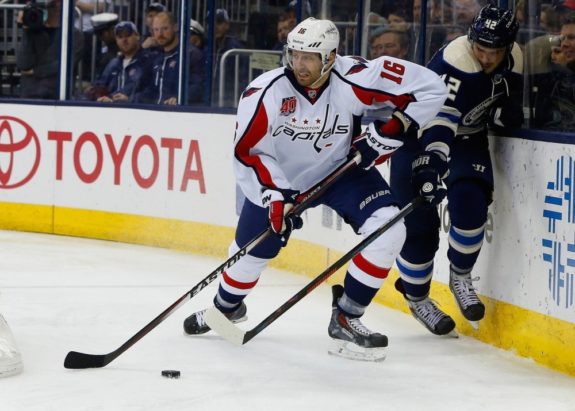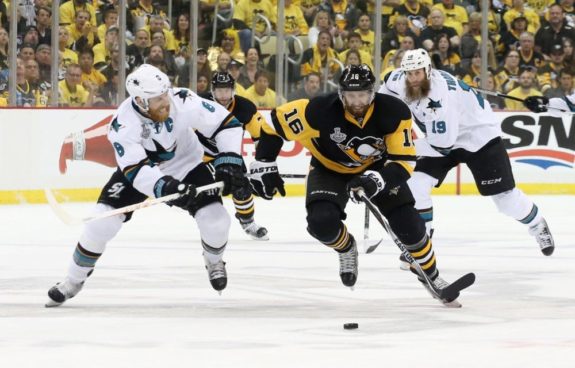In a modest move, the San Jose Sharks acquired veteran forward Eric Fehr for a seventh-round draft pick in 2020.
It is a modest move, and one I like. The move is not risk-free, but the upside exceeds the risk by a bunch.
Eric Fehr
Fehr’s history is pretty straightforward. He has played on good NHL teams throughout his career. The majority of his career came with the team which drafted him, the Washington Capitals. Beginning in 2005, he was on talented Caps teams with tremendous forward depth. He typically played on third or fourth lines. Five times he scored double-digit goals for the Caps. His posted career bests in 2009-10 with 21 goals, 39 points, and a plus-18 rating.

He moved over to the Pittsburgh Penguins in 2015-16, and Sharks fans may recall his goal with two minutes left in Game 4 of the Stanley Cup Final to clinch a 3-1 Pens win.
The following season, he was traded in February to the Toronto Maple Leafs, but things went sour. Fehr only played in five games for the Leafs over a period of about a year. While still with the Toronto organization, he’s spent much of this season with the Anaheim Ducks’ AHL team, the San Diego Gulls, on loan from the Leafs.
Fehr is 32, not old by NHL standards. He’s also a big body. At 6-foot-4he’ll be the biggest Sharks forward on the ice, at least until Joe Thornton returns.
Prior to joining the Sharks, Fehr played in 566 NHL games, totaled 202 points and was a plus-50. He also has 60 games of playoff experience.
The Risks
There are usually risks in a trade. Two common risks are not present in this deal. This will not impact the Sharks’ salary cap in a meaningful way. And the compensation to Toronto is very modest.

The lone risk is Fehr doesn’t play well, or more likely, doesn’t fit in well. In every move, there is a chance the acquired player doesn’t fit it in. It happens often across the league. The Sharks have recent history with this issue with last season’s trade deadline acquisition, Jannik Hansen. He was a solid player in his years with the Vancouver Canucks. In San Jose, though, Hansen was like a shark out of water.
The one meaningful way Fehr can hurt the Sharks is by making mistakes. It could be a simple as turning to the left when a teammate expects him to turn to the right. A goal can cost a team a game and given how close the standings are, a game might be the difference between the playoffs and a long offseason. I don’t see this as a likely scenario, but it is possible.
If it turns out Fehr is simply no longer an NHL-level player, the Sharks can scratch him from the lineup or send him to the San Jose Barracuda. One game into his Sharks tenure, Fehr looks like he can still play at the NHL level.
The Upside
Fehr started on the Sharks’ fourth line. Fourth lines are often about “doing no harm.” Fehr has played this role effectively in the past, dealing with an enormous number of linemates along the way. The Sharks will, no doubt, keep it simple.
The Sharks’ fourth line has been effective most of the season. He’ll be a big body and he joins Barclay Goodrow on this line. This puts the Sharks’ two most bruising forwards together.
In recent games, the Sharks have taken more punishment than they’ve dished out. Part of Fehr’s role may be to dish out punishment, especially if teams continue to take liberties with Sharks players. This is one area where Fehr helps.

The Sharks have depth issues at forward, with injuries to Joel Ward and Joe Thornton, plus the loss of Ryan Carpenter to a waiver claim. On the plus side, Tomas Hertl returned to the lineup after missing only a few games. Fehr offers depth at a time the Sharks are challenged.
In recent games, Sharks coach Peter DeBoer has shortened his bench, resulting in more minutes for the top lines and fewer minutes for the fourth line. If Fehr can upgrade the fourth line, DeBoer can take a more balanced approach. If Fehr can give the coach more confidence in the fourth line, it can keep other players fresher.
In recent games, DeBoer used a fourth line of Goodrow, Danny O’Regan and Marcus Sorensen. They’ve combined for less than 200 NHL appearances. DeBoer has shown a preference for veterans. Once again, Fehr fits the bill. In his first game with San Jose, the fourth line consisted of Fehr, Goodrow and Melker Karlsson. They combine for nearly 1,000 games of NHL experience (regular season and playoffs).
One problem the Sharks do not have is the penalty kill. Still, it’s useful that this is part of Fehr’s repertoire.
Fehr might even offer the Sharks some roster flexibility for a bigger trade, as the trade deadline is just a few days away.
Fehr’s Win-Win Opportunity
There is little doubt Fehr is motivated to play well. Nearly a year playing in the AHL means Fehr is playing to revive his NHL career. He has spent his career playing for good teams and knows what it is like to play in meaningful games. He has a chance to shine in San Jose, and this is about the best possible circumstance he could find to get his career back on track. Success for Fehr in the regular season is helpful, and a good postseason will be enormously helpful.
A motivated player with plenty of big-game experience is a good combination. Fehr is defensively oriented with some offensive ability, a description which also describes the team’s identity.

The upside with Fehr is modest, but the downside risk is almost negligible, which makes it a good trade, on paper. It may not move the needle much, but in a close playoff race and a wide-open playoffs looming, even a minor upgrade could prove meaningful.
Zeke’s Notes
Forty games into the season, I noted the Sharks had played the fewest games in the NHL. This meant the rest of the season would be compressed, with 42 games in 84 days, the densest schedule in the league. Between Jan. 13 and Feb. 23, the Sharks played 22 games in only 41 days (even with the All-Star break), including five back-to-back games. Nine of these games were a third game in four days. There was plenty of travel, too, with 14 road games. Only four times did the Sharks play consecutive games in the same venue.
Give the team credit. Without Joe Thornton for much of this and with players like Joel Ward and Tomas Hertl also missing games, the Sharks are 12-8-2 during this stretch. Still, the dense schedule has taken a toll. The last two games were a blowout loss in Nashville and sluggish loss in Chicago.
The Sharks have now played 62 games, tied (with several teams) for the second-most in the league (Toronto has played 63). In other words, the highly-compressed schedule is over for San Jose. They’ll play their final 20 games of the season over the next 43 days. Not leisurely, but not as intense. Further, once the Sharks return home on Feb. 27, only 7 of their remaining games are on the road, compared to 12 at home.